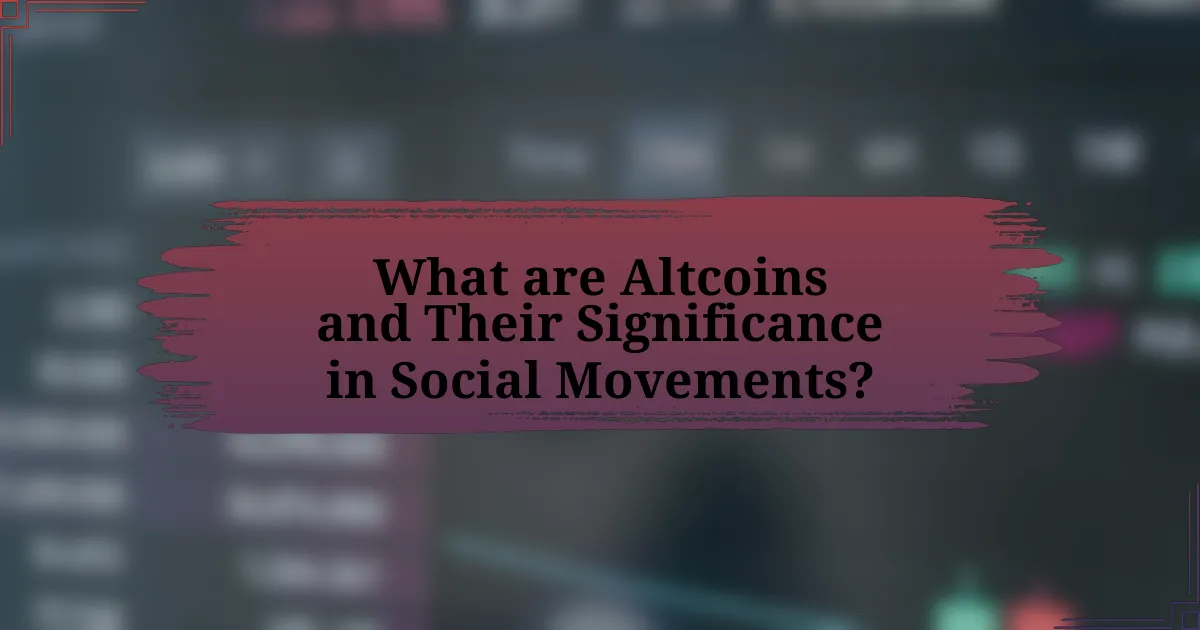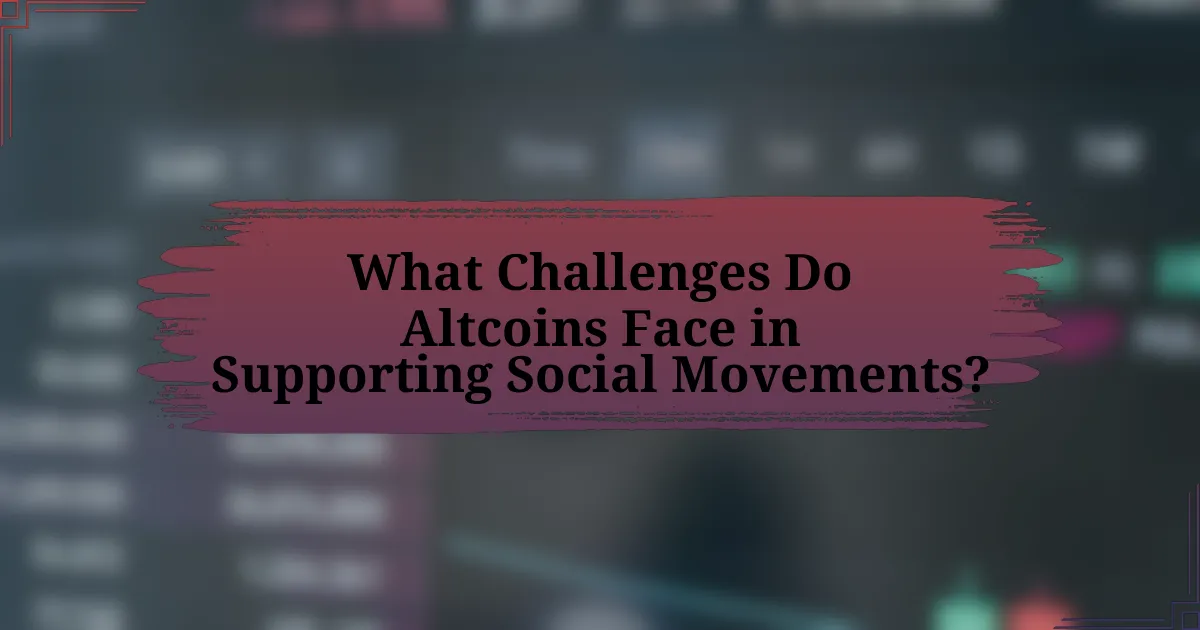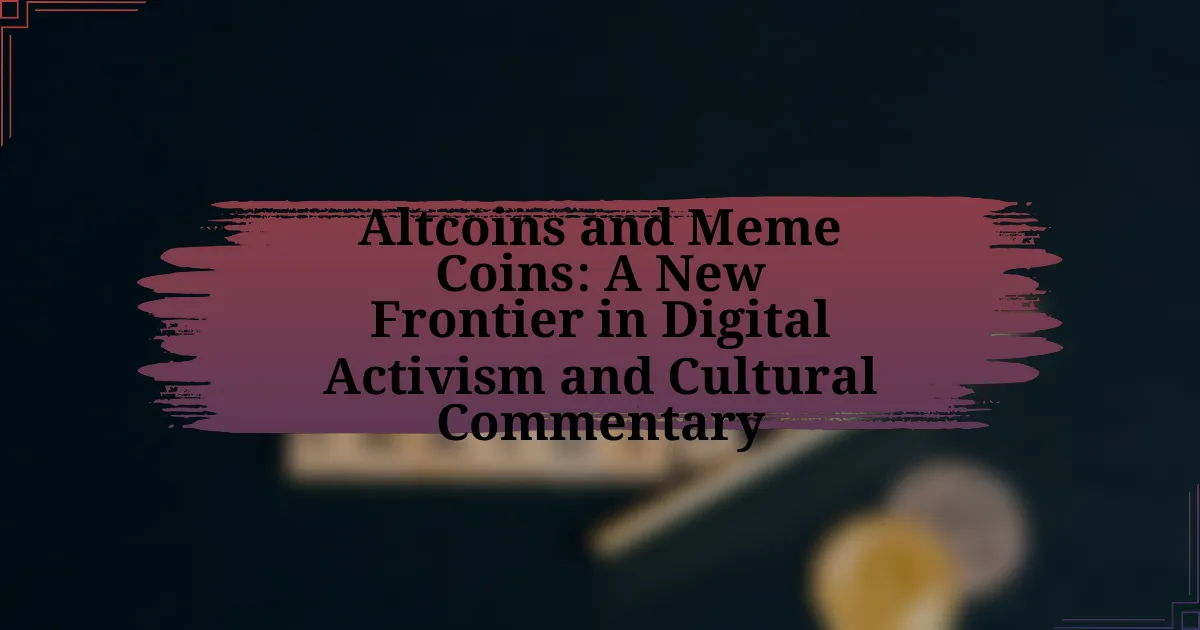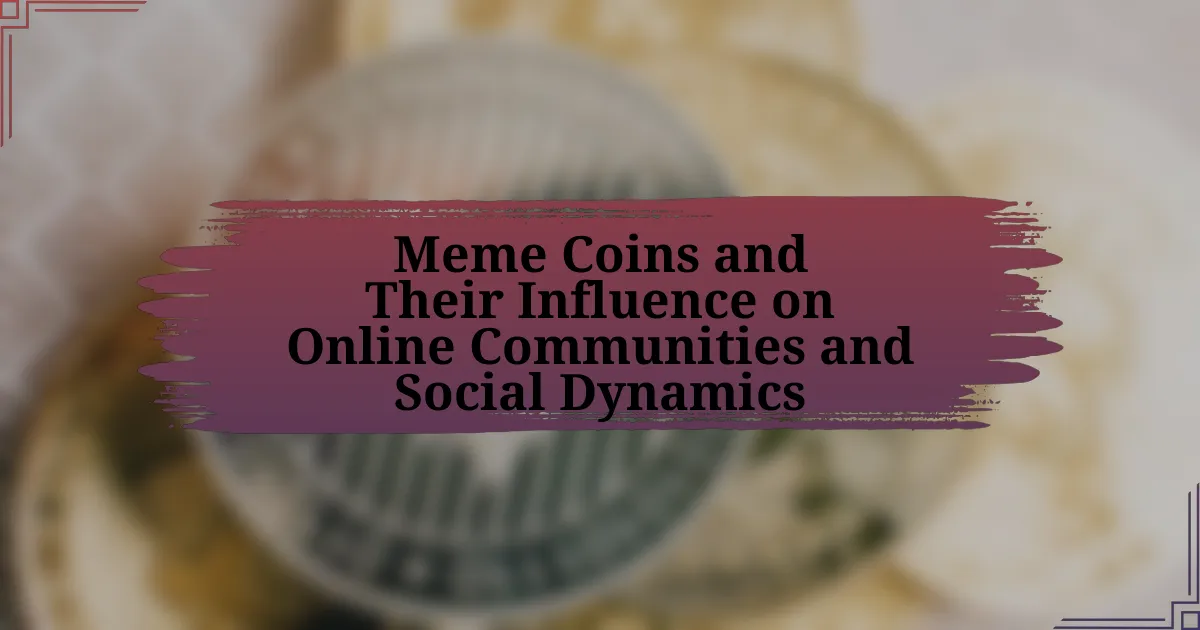Altcoins, or alternative cryptocurrencies to Bitcoin, play a significant role in promoting social movements and cultural change by facilitating decentralized financial transactions and empowering grassroots initiatives. This article explores how altcoins differ from Bitcoin in their focus on specific social issues, their unique features such as decentralized governance and enhanced privacy, and their ability to mobilize communities through community-driven funding mechanisms. It also examines the challenges altcoins face, including regulatory scrutiny and market volatility, while highlighting successful examples of altcoin usage in recent protests and campaigns. Overall, the article underscores the potential of altcoins to enhance transparency, accountability, and community engagement in social movements.

What are Altcoins and Their Significance in Social Movements?
Altcoins are alternative cryptocurrencies to Bitcoin, designed to offer various functionalities and improvements. Their significance in social movements lies in their ability to facilitate decentralized financial transactions, enabling activists to fund initiatives without reliance on traditional banking systems. For instance, during the Arab Spring, cryptocurrencies were used to bypass government censorship and financial restrictions, illustrating their role in empowering grassroots movements. Additionally, altcoins often support specific causes, such as environmental sustainability or social justice, which can mobilize communities and enhance collective action.
How do Altcoins differ from Bitcoin in promoting social change?
Altcoins differ from Bitcoin in promoting social change by often targeting specific social issues and communities, whereas Bitcoin primarily serves as a decentralized currency. For instance, Ethereum enables smart contracts that facilitate decentralized applications aimed at social impact, such as crowdfunding for social causes. Additionally, projects like Ripple focus on financial inclusion by providing low-cost remittance solutions, directly addressing economic disparities. These altcoins often incorporate governance models that allow community participation, enhancing their ability to drive social change compared to Bitcoin’s more rigid structure.
What unique features do Altcoins offer for social movements?
Altcoins offer unique features for social movements, primarily through decentralized governance, enhanced privacy, and community-driven funding mechanisms. Decentralized governance allows participants to influence project direction and decision-making, fostering inclusivity and collective action. Enhanced privacy features protect the identities of activists, enabling them to organize without fear of surveillance or repression. Additionally, community-driven funding mechanisms, such as Initial Coin Offerings (ICOs) or token-based crowdfunding, empower social movements to raise capital directly from supporters, bypassing traditional financial systems that may impose restrictions. These features collectively enhance the operational capacity and resilience of social movements, as evidenced by various successful campaigns that have utilized altcoins for fundraising and coordination.
How do community-driven Altcoins empower grassroots initiatives?
Community-driven Altcoins empower grassroots initiatives by providing decentralized funding and governance structures that enable local communities to support their own projects. These Altcoins often utilize blockchain technology to facilitate transparent transactions, allowing community members to contribute resources directly to initiatives they care about. For example, projects like Giveth and Gitcoin leverage cryptocurrency donations to fund social causes, demonstrating how community-driven funding can lead to tangible outcomes. Additionally, the governance models of these Altcoins often allow stakeholders to vote on project priorities, ensuring that the initiatives reflect the needs and desires of the community. This participatory approach fosters a sense of ownership and accountability, which is crucial for the success of grassroots movements.
Why are Altcoins considered tools for cultural change?
Altcoins are considered tools for cultural change because they enable decentralized financial systems that empower individuals and communities. This empowerment fosters inclusivity and democratizes access to financial resources, allowing marginalized groups to participate in the economy. For instance, projects like Ethereum have facilitated the creation of decentralized applications that support social initiatives, such as crowdfunding for social causes. Additionally, altcoins often embody specific cultural values or ideologies, such as privacy or sustainability, which resonate with particular communities, further driving cultural shifts. The rise of altcoins has also sparked discussions around economic sovereignty and the critique of traditional financial systems, contributing to broader social movements advocating for change.
What role do Altcoins play in funding social causes?
Altcoins play a significant role in funding social causes by providing alternative financial mechanisms that facilitate donations and crowdfunding. These cryptocurrencies often enable lower transaction fees and faster processing times compared to traditional banking systems, making it easier for individuals and organizations to support various initiatives. For instance, projects like Ethereum have been utilized for decentralized fundraising through Initial Coin Offerings (ICOs), allowing social enterprises to raise capital directly from supporters. Additionally, platforms like BitGive leverage Bitcoin and other altcoins to enhance transparency in charitable donations, ensuring that funds reach their intended recipients. This innovative approach to funding has empowered numerous social movements, enabling them to mobilize resources quickly and effectively.
How do Altcoins facilitate decentralized decision-making?
Altcoins facilitate decentralized decision-making by enabling community governance through mechanisms like decentralized autonomous organizations (DAOs) and voting systems. These structures allow stakeholders to propose and vote on changes or initiatives, ensuring that decisions reflect the collective will rather than a centralized authority. For instance, platforms like Ethereum allow users to participate in governance decisions regarding protocol upgrades or funding allocations, which exemplifies how altcoins empower users to have a direct say in the ecosystem’s direction. This decentralized approach enhances transparency and accountability, as all transactions and votes are recorded on the blockchain, making it difficult for any single entity to manipulate outcomes.

How do Altcoins Influence Social Movements Globally?
Altcoins influence social movements globally by providing decentralized financial systems that empower individuals and communities to fund initiatives and support causes without relying on traditional banking systems. For instance, during the Arab Spring, cryptocurrencies facilitated donations to activists, enabling them to organize protests and share information securely. Additionally, altcoins often promote transparency and accountability through blockchain technology, which can help expose corruption and mobilize support for social justice issues. The rise of altcoins has also led to the creation of platforms that allow for crowdfunding social projects, further amplifying the impact of grassroots movements.
What examples illustrate the impact of Altcoins on social movements?
Altcoins have significantly impacted social movements by providing alternative funding mechanisms and facilitating decentralized activism. For instance, the rise of Ethereum has enabled various social initiatives to launch Initial Coin Offerings (ICOs) for fundraising, such as the “Giveth” platform, which supports charitable projects through blockchain technology. Additionally, the use of cryptocurrencies like Dash and Monero has empowered activists in oppressive regimes by allowing them to bypass traditional banking systems and maintain financial privacy, as seen during protests in Venezuela where citizens utilized these altcoins to secure funds without government interference. These examples demonstrate how altcoins can enhance the operational capabilities of social movements and promote cultural change by fostering financial independence and transparency.
How have specific Altcoins been used in recent protests?
Specific Altcoins, such as Ethereum and Bitcoin Cash, have been utilized in recent protests to facilitate donations and support for activists. For instance, during the 2020 Black Lives Matter protests, Ethereum was prominently used to raise funds for various organizations advocating for racial justice, allowing for quick and transparent transactions. Additionally, Bitcoin Cash has been employed in protests in Venezuela, where hyperinflation has made traditional currency unreliable, enabling citizens to support opposition movements and access essential goods. These uses demonstrate how Altcoins can provide financial solutions in times of social unrest, enhancing the ability of movements to mobilize resources effectively.
What lessons can be learned from successful Altcoin campaigns?
Successful Altcoin campaigns demonstrate the importance of community engagement and clear communication. These campaigns often thrive by fostering a strong, active community that feels invested in the project, as seen with Ethereum’s early development, where community feedback shaped its evolution. Additionally, transparency in project goals and progress builds trust, exemplified by Cardano’s approach of regular updates and academic rigor in its development process. Furthermore, effective marketing strategies that highlight unique value propositions can significantly enhance visibility and adoption, as evidenced by the success of Binance Coin, which leveraged its exchange platform to drive demand.
How do Altcoins foster community engagement and activism?
Altcoins foster community engagement and activism by enabling decentralized governance and facilitating peer-to-peer transactions that empower users. These cryptocurrencies often incorporate community-driven initiatives, allowing holders to participate in decision-making processes, such as voting on project developments or funding social causes. For instance, projects like Dash and Decred utilize governance models that give stakeholders a voice, enhancing community involvement. Additionally, altcoins can support fundraising for social movements through Initial Coin Offerings (ICOs) or token sales, which have been used to finance various activist campaigns, demonstrating their role in mobilizing resources for change.
What platforms support Altcoin-based social initiatives?
Platforms that support Altcoin-based social initiatives include Ethereum, which enables decentralized applications and smart contracts for social projects, and Binance Smart Chain, known for its low transaction fees and support for various social tokens. Additionally, platforms like Cardano and Solana are gaining traction for their scalability and community-driven projects. These platforms facilitate fundraising, community engagement, and the creation of decentralized autonomous organizations (DAOs) that empower social initiatives.
How do social media and Altcoins work together to promote movements?
Social media and Altcoins collaborate to promote movements by leveraging the viral nature of online platforms and the decentralized financial mechanisms of cryptocurrencies. Social media facilitates rapid information dissemination, allowing movements to gain visibility and engage a global audience, while Altcoins provide alternative funding sources through token sales and donations, enabling grassroots initiatives to sustain their efforts. For instance, during the 2020 Black Lives Matter protests, social media campaigns significantly increased donations to Altcoin-based funds, demonstrating how these digital currencies can support social causes effectively.

What Challenges Do Altcoins Face in Supporting Social Movements?
Altcoins face several challenges in supporting social movements, primarily including regulatory scrutiny, market volatility, and lack of mainstream adoption. Regulatory scrutiny can hinder altcoins’ ability to operate freely, as governments may impose restrictions that limit their use in fundraising or transactions for social causes. Market volatility poses a risk, as the fluctuating value of altcoins can undermine their effectiveness as a stable means of support for movements, making it difficult to rely on them for consistent funding. Additionally, the lack of mainstream adoption means that many potential supporters may be unfamiliar with altcoins, limiting their reach and impact in mobilizing resources for social movements. These factors collectively impede the potential of altcoins to effectively support and sustain social movements.
What regulatory hurdles impact the use of Altcoins for social causes?
Regulatory hurdles impacting the use of Altcoins for social causes include compliance with anti-money laundering (AML) and know your customer (KYC) regulations, which can restrict the ability of organizations to raise funds anonymously. Additionally, varying regulations across jurisdictions create uncertainty, making it difficult for projects to operate globally. For instance, in the United States, the Securities and Exchange Commission (SEC) has classified some Altcoins as securities, subjecting them to stringent regulations that can hinder fundraising efforts for social initiatives. These regulatory frameworks can limit the accessibility and flexibility of Altcoins, ultimately affecting their potential to support social causes effectively.
How do security concerns affect Altcoin adoption in activism?
Security concerns significantly hinder Altcoin adoption in activism by creating distrust among potential users regarding the safety of their transactions and personal data. Activists often operate in high-risk environments where surveillance and repression are prevalent, making them wary of using digital currencies that may expose their identities or financial activities. For instance, incidents of hacking and theft in the cryptocurrency space have led to a perception that Altcoins are not secure enough for sensitive transactions. Additionally, regulatory scrutiny and the potential for government intervention can further discourage activists from adopting these currencies, as they fear repercussions for their financial choices. This combination of risks ultimately limits the willingness of activists to embrace Altcoins as a viable tool for funding and supporting social movements.
What are the risks of volatility in Altcoin markets for social movements?
Volatility in Altcoin markets poses significant risks for social movements by undermining financial stability and predictability. When Altcoin values fluctuate dramatically, it can lead to uncertainty in funding for initiatives, making it difficult for movements to plan and execute long-term strategies. For instance, a sudden drop in the value of a cryptocurrency used for fundraising can diminish the resources available for campaigns, thereby impacting their effectiveness. Additionally, high volatility can deter potential supporters from contributing, as they may perceive the investment as too risky. This financial unpredictability can ultimately weaken the overall impact of social movements that rely on these digital currencies for support and mobilization.
How can Altcoins be effectively utilized for cultural change?
Altcoins can be effectively utilized for cultural change by enabling decentralized funding for social movements and fostering community engagement through blockchain technology. These cryptocurrencies provide an alternative financial system that empowers individuals and groups to support causes without relying on traditional banking systems. For instance, projects like Giveth and Gitcoin leverage altcoins to facilitate donations and incentivize contributions to social initiatives, thereby promoting cultural shifts towards community-driven solutions. Additionally, altcoins can enhance transparency and accountability in funding, as transactions are recorded on a public ledger, which builds trust among supporters and encourages broader participation in cultural change efforts.
What strategies can activists employ to leverage Altcoins?
Activists can leverage Altcoins by utilizing them for fundraising, creating decentralized applications, and promoting community engagement. Fundraising through Altcoins allows activists to tap into a global donor base, as cryptocurrencies can facilitate anonymous donations and reduce transaction fees. For instance, projects like the Pineapple Fund have demonstrated successful fundraising efforts using Bitcoin and other Altcoins for charitable causes.
Additionally, activists can develop decentralized applications (dApps) on platforms like Ethereum to create transparent and secure systems for organizing and mobilizing support. These dApps can help in tracking donations, managing resources, and ensuring accountability, which is crucial for building trust within communities.
Moreover, promoting community engagement through educational initiatives about Altcoins can empower individuals to participate in the cryptocurrency ecosystem, fostering a sense of ownership and involvement in social movements. By integrating Altcoins into their strategies, activists can enhance their outreach and effectiveness in driving cultural change.
How can communities build sustainable models using Altcoins?
Communities can build sustainable models using Altcoins by creating decentralized finance (DeFi) platforms that facilitate peer-to-peer transactions and support local economies. These platforms can enable communities to issue their own Altcoins, which can be used for local trade, incentivizing participation and fostering economic resilience. For instance, the use of community tokens has been shown to enhance local engagement and support small businesses, as evidenced by projects like the Local Exchange Trading Systems (LETS) that utilize alternative currencies to promote local spending. By leveraging blockchain technology, communities can ensure transparency and security in transactions, further encouraging trust and participation among members.
What best practices should be followed when using Altcoins for social movements?
When using Altcoins for social movements, best practices include ensuring transparency, fostering community engagement, and prioritizing security. Transparency is crucial as it builds trust among supporters; for instance, projects like Ethereum have successfully utilized open-source code to allow community scrutiny. Engaging the community through social media and forums encourages participation and feedback, which can enhance the movement’s reach and effectiveness, as seen in the rise of grassroots campaigns. Lastly, prioritizing security protects funds and data, with examples like the DAO hack highlighting the need for robust security measures in cryptocurrency projects.




